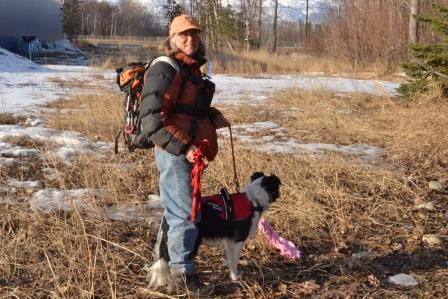
Home > Dispatches > Daily Dispatches 2014 > Daily Dispatch #89
March 30, 2014: Dog Training: Team Work and Sniffing Butts
I had yet another revelation yesterday, and this is that search and rescue work isn’t just about getting the dog trained, or about my willingness to take physical risks. At the same time, it’s about being a member of a team. This is something that I’ve never done before. I have been a group member, and been a group leader. However, there are differences between the two. The main difference between being a group member and a group leader is that groups are short lived, transient communities while teams are long lived, intransient communities. Groups also |
|
| require some commitment to the task at hand while teams require considerable commitment to the task at hand. Teamwork, which is what I’m talking about here, requires that one sets their ego at door when jumping into the fray, and assisting others in getting the job at hand done. It also means staying clear (as best one can) of petty bullshit squabbles. And it means refusing to take things personally when being responsible for something going awry. Search and rescue teamwork is complicated by the fact that dogs are involved. I won’t go into particulars here, but there are some dogs in the Mat-SAR K-9 group who upon occasion have aggressive tendencies. The majority of these dog owners know what the aggression triggers are, and are careful to let others know the same. These are mainly the more experienced handlers. I am fortunate to have a dog who is socially adept. This, for me, is a dog send because it means that I have one less teamwork related item to worry about. (I subscribe to the belief that the world revolves around me, which isn’t always conducive to being a good team member.) Still, I have to make sure that all times during training that I keep a close eye on Ryder and make sure that I keep her a safe distance from the more questionable dogs. And the same holds true of myself. And at the same time, I must make sure that that when she’s loose, that questionable dogs are on their leashes, or vice versa. So, in the above and other respects, the above-mentioned mental aspects of search and rescue teamwork are more challenging to me than are the physical aspects. When the going gets tough, the tough turn pro. This is what Hunter S. Thompson once said. I too think that Mr. Siggi wanted me to take on this more-socially related challenge. He foresaw that I needed to interact more with my own kind, and figured that a dog like Ryder might be sort of a conduit for this kind of activity. How else does this explain what happened? We found Ryder at an Idaho trailhead and took her on. And right at about that time, Stacey re contacted me about doing search and rescue work. I do not think that this was a coincidence. So, I’m going to continue to be a search and rescue volunteer – as difficult at times as I perceive the teamwork aspect of this to be. |
|
